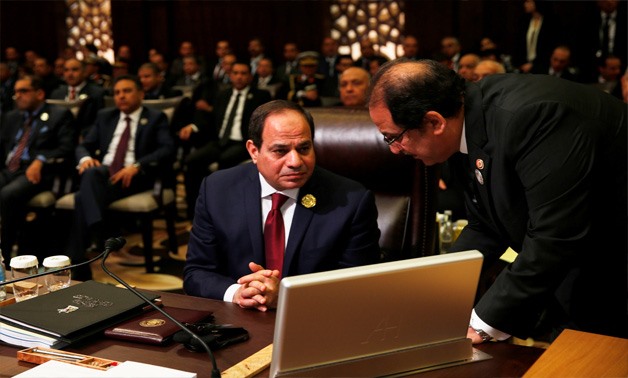
Egypt’s President Abdel Fattah al-Sisi -
REUTERS/Mohammad Hamed
CAIRO – 5 April 2017: As Egyptian President Abdel Fatah al-Sisi is in Washington D.C. on his first state visit and discussing his country’s fight against terrorism, Egypt Today spoke with a U.S. Army specialist who stressed the importance of strong bilateral military cooperation “to back Egypt in its fight.”
Thomas Little, an international affairs specialist for the U.S. Army, spoke to Egypt Today via email about the possible implications of President Sisi’s visit to Washington on both domestic and regional levels.
Asked about possible re-boost of U.S. military aid to Egypt, Little confirmed the need for the U.S. to rebuild strong bilateral military cooperation. "The United States does this to back Egypt in its fight against Islamic terrorism," he said. “It is important to have Arab allies out in front of the terrorism fight, so that it is not just the United States and other Western nations doing all the fighting.”
“President Trump has come out strong early in his administration that he will continue and even expand the war against terrorism,” Little told Egypt Today. “His meeting with Egyptian President Sisi this week will be an opportunity to meet each other and commit to continuing the strong working relationship between the two nations.”
The U.S. gives Egypt an annual military aid package of $1.3 billion. The aid was partially suspended in August 2013 following the dispersal of pro-Muslim Brotherhood sit-ins at Rabaa Al-Adaweya and Al-Nahda squares on August 14; in April 2014, the United States lifted the suspension by delivering 10 helicopters.
On the regional level, Little discussed the current Arab powers’ allies and their stand against Iran, saying that “Saudi Arabia and Bahrain are large buyers of advanced U.S. military weapons, designed to boost their internal security and provide a deterrent against Iran. Both countries are key allies of the United States in the Arabian Gulf and have made tremendous strides in modernizing their military capabilities.”
Relations between the U.S. and Saudi Arabia were strained after Egypt’s January 25 Revolution ousted former Egyptian President Hosni Mubarak in 2011. “Saudi Arabia reportedly negotiated a deal to allow Mubarak political asylum in the Kingdom and avoid arrest,” Little said. “President Obama did not favor this and the arms deal was scuttled.”
“This is critical, since Saudi Arabia and Bahrain are both important allies not only against Iran, but also in fighting ISIS in Yemen, Iraq and Syria. Both Saudi Arabia and Bahrain bring stability to the Arabian Gulf area, which is critical,” Little added.
Comments
Leave a Comment